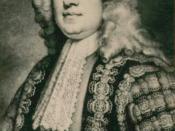"The Castle of Otranto" can be interpreted as a "dream work." By interpreting the novella as a dream, it can be analyzed at both the manifest and latent levels by applying Freudian concepts and ideas. According to Freud, dreams fulfill wishes and vent unconscious desires.
At the manifest level or the obvious and clear level, Walpole fulfills his desire of helping a friend and removing an evil tyrant from power. Manfred, the prince of Otranto represented King George III of England, whom Walpole saw as a tyrant. Isabella from the novella represented Walpole's dearest friend, Conway, whom lost his job and income. Theodore, the unexpected peasant who aids Isabella in her escape, represented Walpole.
At the latent level or distorted and hidden level, the readers can see how the book mirrors his life. During Walpole's dilemma with helping Conway, his father, Sir Robert Walpole, refused to aid Walpole.
This added to the tension between him and his father. At an early age, Walpole was a gentle and sickly boy. His mother gave him the affection that was lacking in his relationship with his father. After the passing of Walpole's mother, Walpole's father quickly married his mistress, Mary Skerrit. This pained Walpole and according to Freud, is known as the "Oedipus Complex," where a son desires to kill his father in order to be with his mother. Although not to such an extreme, the "Oedipus Complex" can be applied and seen in the novella. Manfred is very like Walpole's father in that Manfred has an unhappy relationship with Hippolita and decides to divorce her to marry Isabella. Unlike Walpole's father, Manfred does not succeed but this leads to his demise.


